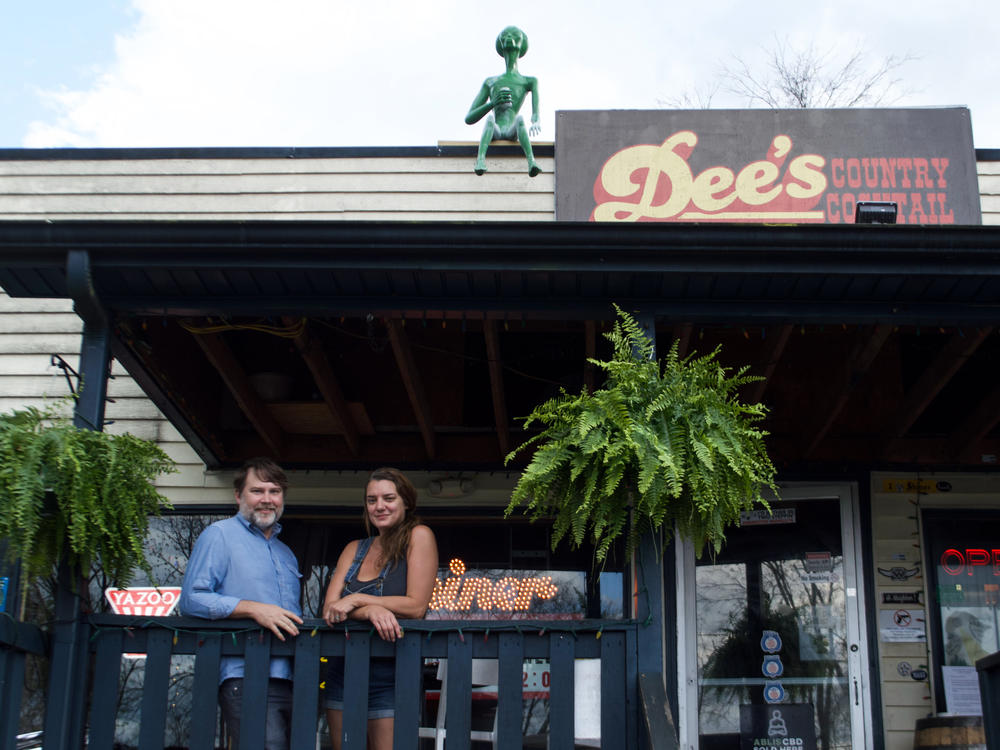Section Branding
Header Content
Open Up And Say... 'Huh?': Nashville Venues Grapple With City's Lack Of Reopening Plan
Primary Content
The first thing you might notice about Dee's Country Cocktail Lounge is the giant alien, named Rick, perched on its slanted roof. The second, several very-prominent signs requiring customers to wear face masks: "Stand up, mask up," one says. "If you have a medical condition that prevents you from wearing a mask, you probably shouldn't be in a bar," another says.
Throughout the pandemic, partner-owners Amy Dee Richardson and Daniel Walker say they tried to do the right thing — requiring temperature checks at the door, strictly enforcing mask rules and protecting the health and safety of their employees and patrons alike. So when the couple saw pictures of businesses packed to the brim on Nashville's tourist destination, Lower Broadway, they were frustrated. Even Gov. Bill Lee took to Broadway in March for a maskless promotional video inviting spring breakers to the city.
"It was a slap in the face," Richardson says. "You're not really relevant unless you're a big machine."
Nashville is used to being a music industry leader, but when it comes to reinvigorating the long-suffering live music scene, the city lacks a strategic or cohesive plan of attack. That has forced Music City's venues and musicians to make tough decisions. For Dee's, that's meant rounds of whiplash — opening, closing and opening again — per government orders and rising COVID numbers.
For Luke Ehrmann, co-owner of the venue East Room, it's meant trying to come up with his own rules. "There's no government law that could say, 'Oh, you guys should open up this day,'" he says.
His guiding principle is to try and figure out when it's safe to open, weighing case numbers and crunching capacity percentages, calculating how much it will cost to pay staff or artists. But what are the magic numbers? How do they know if it's the right time?
"You don't," Nathan Arrigton, the East Room's other owner, says. "You don't at all. We're kind of all wait-and-see."
Walker, Dee's co-owner, says he "would like to see some more help coming from the government in the observation that, 'Hey, we are Music City, so let's go ahead and protect our musicians, our artists, and the venues that support those musicians more.' "
Musicians Weigh Safety And Money
Getting musicians to play again has been slow going, Walker says. "I'm not trying to reach out to artists and beg them to play when they're not ready yet," he explains.
He says some musicians might be game to perform, but aren't comfortable encouraging fans to come out to shows. So, like many, he started livestreaming, allowing fans to tip the artists and enjoy the music from home.
Ryan Madora is a bass player for hire, and usually takes gigs supporting bands or playing on recording sessions, neither of which she feels comfortable doing until more people are vaccinated. She says in a lot of ways it's a luxury to not play music right now — she has been doing private lessons online and remote sessions to make ends meet. But she says she feels for other musicians who aren't in the same position.
"When you make 90 to 100 percent of your income from playing live shows, you really don't have a choice," Madora says. "It's either, I take these gigs or I get a job working and doing something outside of music."
A recent music industry report found that more than half of Nashville's songwriters have a second job to support their creative pursuits. Relying on songwriting for income became even more untenable during the pandemic, with the number of songwriters that made under $25,000 nearly doubling from the year before.
Madora fears she'll miss out on future opportunities after taking a year away from live shows.
"I'm worried that I'm taking myself out of the scene that I've spent so long trying to get into," Madora says. "You can only say no so many times before somebody doesn't call you altogether."
Even if musicians do want to take gigs, a lot of places have dropped their pay. Musician Colleen Orender says that was the case when she was looking for gigs again. Now, Orender performs at Dee's every other Sunday. She says it's frustrating to see the city take such a hands-off approach, when live music is one of the main reasons people visit Nashville.
Music City, Yet No Music Plan
"I don't think there's been any clear support for our community at all," Orender says. "Music is a draw for everybody that comes to Music City, that's what we are called, so they should have figured that out first."
Other cities around the country have done just that — putting music and arts at the forefront of their reopening plans, announcing creative ways to pump life back into the scene.
New York has made it clear that it sees arts and culture as a key part of economic revival, relaunching indoor and outdoor concerts and planning for pop-up performances on the streets. New Orleans has several music festivals on deck for the fall to celebrate its music community. Across the pond, the U.K. released a comprehensive roadmap for the return of live music. Even Akron has a plan for festivals and a concert series downtown.
Nashville's mayor's office says they hope investments in the vaccine effort and tourism will benefit the city's musicians and venues.
However, they confirmed they have no big plans on the live music front.
The city's musicians and venue operators are not alone in wishing the mayor would reconsider — even the health department says a flashy kick-off event sounds like a great opportunity to get more people vaccinated.
Copyright 2021 WPLN News. To see more, visit WPLN News.

